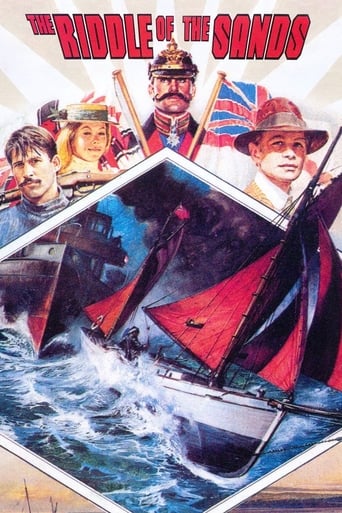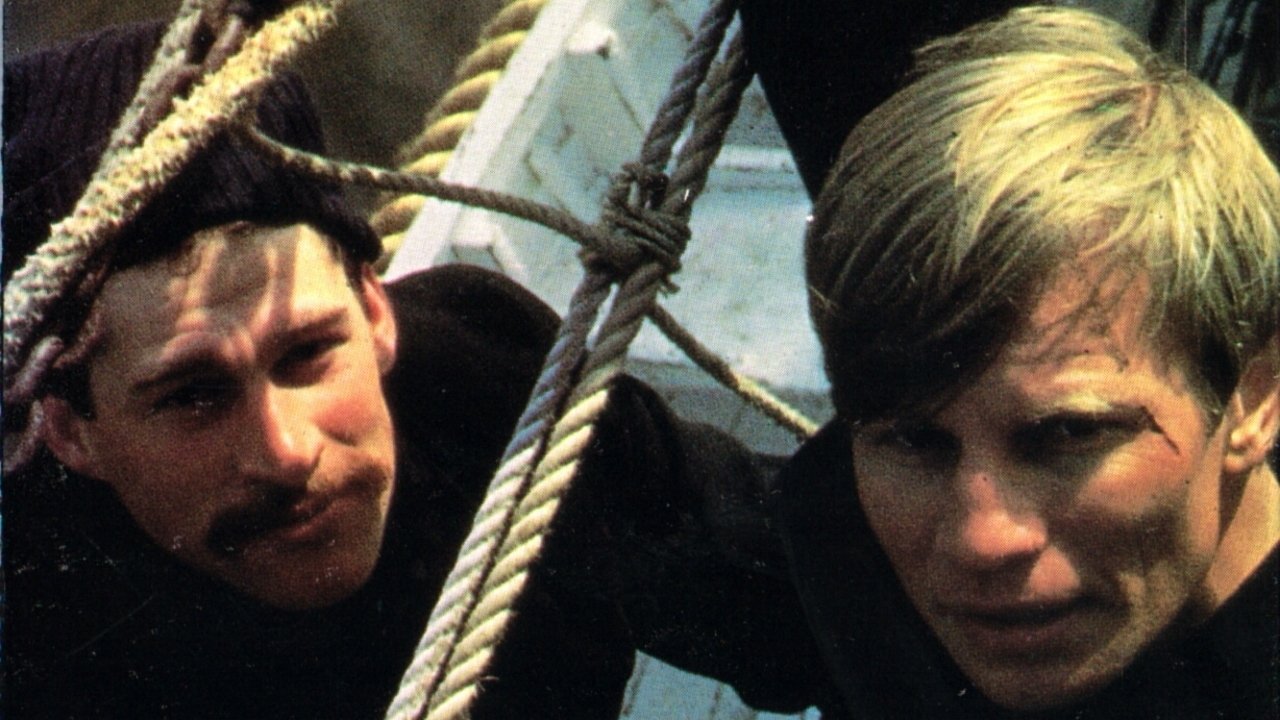Leofwine_draca
I thoroughly enjoyed this old-fashioned spy yarn based on a novel by Erskine Childers. The story is simplicity in itself: a quintessentially British yachtsman, Arthur Davies, is exploring off the coast of Germany when he uncovers some strange activity. He calls in his upper-crust friend, Carruthers, and the two soon find themselves out of their depth and caught up in some sinister events.Okay, so there isn't much story to go along with, and the story that there is is rather predictable. That's beside the point: RIDDLE OF THE SANDS is a strongly visual film that conveys the joys of being free on the oceans, as well as the pleasure of a world that was a lot simpler than ours. It's well-shot throughout with an infectious charm, and as the two leads, Simon MacCorkindale and Michael York have a wonderfully deadpan chemistry.The thriller and spy aspects, although relatively mundane by modern-day standards, are interspersed well with the rest of the story, and Jenny Agutter turns up as lovely as ever. There are some well-handled set-pieces dotted throughout - the atmospheric journey through the fog, the hide-out in the loft, the dinner scene - and if the film doesn't perhaps excite you as it might, then it leaves you with a warm and cosy feeling afterwards, like the effect of sitting by the dying-down remnants of a roaring fire.
screenman
Coming 3 years after the even more insipid 'Logan's Run', Micheal York and Jenny Agutter are paired-up again in more conservative dress, but this time they're in the past instead of the future.Under wicked Kaiser Wilhelm, the Germans are plotting a covert sea-borne invasion of Britain. An English holiday-maker accidentally stumbles upon their scheme whilst sailing.It's a very slowly evolving drama, played almost as shallowly as the waters they navigate. Fay Mr York may be handsome in an artist's model sort of way but never passes for an action man. His effeminate voice certainly doesn't help. Jenny Agutter does her usual pose of fresh-faced innocence with which she was invariably been typecast. I met her a few months ago in Camberwell, and apart from a few eye-lines hasn't changed all that much.Unlike most of the genre, ie; spying, sabotage, etc; the pace is largely unhurried, with none of the untimely shocks or bloody murders one usually associates with the genre. The relaxed and rather light-hearted way in which the story unfolds seems to hark back to a more civilised time. The whole production is reminiscent of 'The Railway Children', as though primarily aimed at kids. It's not just as if the plot is set in the early part of the 20th century, but is being narrated from the same perspective. That's cleverly done (if it was intended) but even for 1979 vintage the style requires a little getting used to. It's constantly on the edge of becoming boring - which is what sailing is like if you're used to powerboats. Though it usually manages to right itself before complete capsize.Photography is sympathetically worked, giving an excellent sense of obscurity. And combined with the reflective music score together they lend the movie a 'water-colour' feel.Compared to modern productions with their frenetic cut-and-cut-again editing, confrontational in-you-face drama, and flair for the overstatement, the movie really does seem like a postcard from the past. But that's not to say it isn't engaging and a pleasure to see.If it's on the telly (typically Saturday afternoon) and I've nothing else to do then I can't help watching it. Though I'm never quite satisfied with it at the end. It seems to lack something, but I don't know quite what. Maybe I've just watched too many 'action' movies.
andy-782
If you've read the book you'll realise that it couldn't be made into a 90 minute or so film. Bits have to be cut and some scenes adapted so that the film contains a flowing understandable narrative. Often this is not particularly successful. Riddle of the Sands suffers to some extent in this way. Nevertheless this is a pretty good attempt at transferring the book to film. Michael Yorke and Simon McCorkindale are right for the parts they play. Neither are my favourite actors but I don't think many others would have portrayed the characters, warts and all, as realistically. The supporting cast are where the real strength of the film lies. Hans Meyer as Grimm is wonderfully sinister, as indeed is Michael Sheard as Boehme. Alan Badel was one of the best actors ever and his portrayal of Dollman is flawless. Jenny Agutter as Clara also shines. The music by Howard Blake deserves mention because the soundtrack is so important when setting the mood and, besides, the recurrent theme is a very nice piece of music. This is a slow-paced film but is nonetheless a powerful and well told story. If you want fast action and explosions everywhere give it a miss and head for some standard Hollywood identikit action film. If you want a well made story set in beautiful surroundings with good understated performances and a decent soundtrack try and hunt down a copy of the video or catch it on one of its rare TV showings.
L. Denis Brown
Although Erskine Childers 1903 book The Riddle of the Sands is now more than a century old, it remains for me the finest espionage novel ever written. This is no doubt partly because I was myself a yachtsman familiar with sailing among the North Sea sandbanks and mudflats, so the descriptions of dramatic battles with falling tides remain very real to me. But apart from this it is a real pleasure to read a genuine spy thriller free of the usual code breaking sequences or a plethora of violent deaths. And it must be remembered that this book is reputed to have drawn attention to an unrecognised threat to the U.K. so effectively that it led to changes in British national defence policies prior to World War I. Few other books have ever been able to point to such a dramatic significance.
SPOILER AHEAD - It is amazing that this book was never filmed until 1979, and remains incredible to me that the film is still so little appreciated it has never been released in the form of a DVD. Even at the level of a travelogue, the muted colours and atmospheric rendering of the yachting scenes in the Fresian Islands make it well worth watching. Beyond this the story of two young yachtsmen who stumble on the plans being prepared for a German invasion of largely undefended stretches of low lying English coastline in East Anglia is a real thriller, and the characterisation in the film does not fall too far behind that which made the original novel so famous. The photography is also almost impeccable. The key chapter of the book "Blindfold to Memmert" describes an incredible feat of navigation with two oarsmen piloting their dinghy about 13 miles across drying sandbanks through a thick fog. A thick fog does not make for a very dramatic picture and transcribing this chapter onto celluloid as a gripping story was a remarkable feat which has not always been appreciated; but I tremble to think about what might have been produced with a less understanding Director and cameramen. Unlike many movies based on espionage novels, this film is reasonably true to the text, and still more true to the spirit, of the original book; even though the final sequences have been spiced up a little to make the film more exciting. Amazon.com still list this cracker in the form of a videotape, but it is more than time for us to be able to purchase it as a DVD.


 AD
AD


